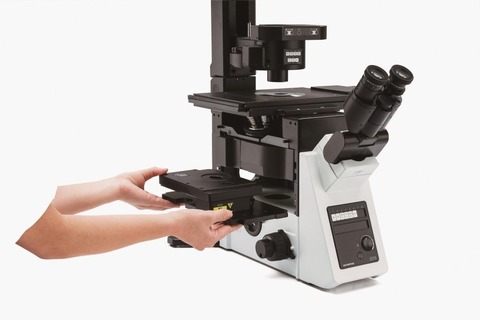
Olympus has introduced advanced optical modules for increased flexibility in its inverted microscope frame design.
The IX3 series can now be further optimised for a wider range of live cell imaging applications including in vitro fertilisation, with motorised functionality for accuracy and easy operation.
Extending the capabilities of the fully customisable IX3 inverted microscope frame, Olympus has expanded its range of compatible, interchangeable optical modules.
Ease-of-use and accuracy are improved via motorised components, which also present a cost-efficient means to gradually upgrade to a fully motorised microscope system.
The IX3 series is designed to offer a completely modular and flexible system. With a swappable deck design similar to a chest of drawers, optical modules are easily exchanged into the accessible infinite light path, moulding the IX3 microscope to the requirements of the user.
Building upon this expandability, the range includes a motorised right side port with C-mount (IX3-RSPCA) allowing access to additional components such as detectors and light sources that can be directed into the infinite light path, delivering greater freedom in time-lapse studies and live cell imaging techniques.
The Olympus motorised fast filter wheel (U-FFWEM) can now also be integrated into the infinite light path using the Olympus optical breadboard (IX3-EMDECK) deck adaptor platform.
Motorised filter wheels can switch between fluorescent channels in 60 milliseconds, ideal for photomanipulation experiments.
To further improve the performance of these studies, the excitation light measurement module (IX3-EXMAD) directly measures and records light intensity across the sample, for improved reproducibility and accurate quantitative analysis of light stimulation.
Further optimisation of the IX3 frame enables full motorisation of in vitro fertilisation (IVF), facilitating the highly accurate IVF workflow.
The dedicated motorised middle long working distance condenser (IX3-MLWCDA) offers motorised adjustment for optimum contrast, and is compatible with all necessary IVF observation methods (DIC, relief-contrast and polarisation).
Fully motorised DIC observation is now also possible with the DIC prism slider (IX3-DICTA). This facilitates not only micromanipulation workflow but is also interesting for time-lapse studies involving fluorescence and DIC observation in parallel.






